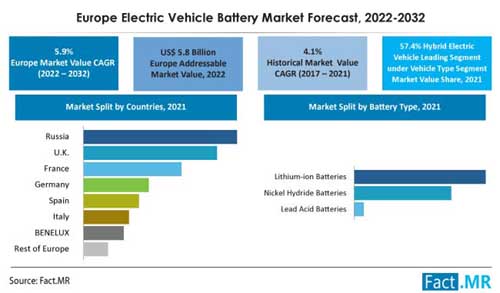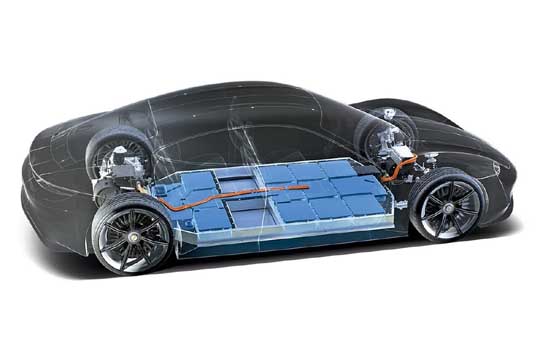Sales of electric vehicle batteries in Europe are valued at US$ 5.8 billion in 2022. The Europe electric vehicle battery market is predicted to rise at 5.9% CAGR to exceed a valuation of US$ 10.3 billion by end of 2032.
US$ 4.5 billion of absolute dollar opportunity (ABS) is likely to be generated by the market over the assessment period (2022-2032).
Rising interest amongst consumers to purchase electric vehicles owing to escalating environmental awareness will fuel electric vehicle battery market growth in Europe. The market is witnessing enhanced investments on the back of benefits offered by governments on electric vehicles. Also, the incorporation of product innovation in electric vehicle batteries will further supplement market growth over the coming years.
Europe Sales Analysis of Electric Vehicle Batteries (2017-2021) Vs. Market Growth Forecasts (2022-2032)
Several factors are playing a significant role in influencing the sales of electric vehicle batteries in Europe, such as rising fuel prices, increase in demand for zero-emission vehicles on the back of rising environmental awareness and protection needs, and stringent pollution norms, along with depleting fossil fuel reserves. Rise in the development of batteries with higher efficiency for electric cars will further supplement market growth in Europe over the coming years.
- According to the European Battery Alliance (EBA), Europe is on the path to becoming the world’s biggest lithium-ion battery cell maker by the end of 2025.
The country is on a mission to create a battery value chain that is competitive, innovative, resilient, and sustainable at the same time. Along with this, the region is a hotspot for investments by major Asian players.
- Short Term (2022 Q2 to 2025): Short-term demand is likely to surge on the back of an increase in demand for electric vehicles.
- Medium Term (2025-2028): Infusing innovation in product offerings, such as launching sand batteries, high-energy-density batteries, and Wi-Fi-powered batteries, to fuel market growth in the medium term.
- Long Term (2028-2032): Manufacturers incorporating new technologies in the batteries of electric vehicles will fuel long-term market demand.
The Europe electric vehicle battery market witnessed a historic growth rate of 4.1% during the 2017-2021 years, and is predicted to rise at 5.9% CAGR throughout the forecast years of 2022-2032, as per the detailed analysis done by Fact.MR, a market research and competitive intelligence provider.

Analysis by battery type and country is provided in a nutshell in the above image. Under the battery type segment, lithium-ion batteries held a major market share of 55.3% at the end of 2021.
Why is Demand for Electric Vehicle Batteries in Europe Set to Rise Rapidly?
“Increasing Private Equity Investments and Government Incentives on Electric Vehicles”
A major factor driving market growth is the rising number of investments by private equity firms in the European region. Firms are seeking investment opportunities in the market by following the buy-and-build concept. Investors are targeting Germany and the U.K. to buy major battery manufacturing start-ups and companies owing to the high growth prospects of OEMs in these countries.
In addition, governments are also offering attractive incentives to consumers for purchasing electric vehicles. This has led to enhanced sales of electric vehicles, majorly in Switzerland and Norway. Consumers are preferring electric vehicles over IC engine vehicles as they are being exempted from vehicle fees such as VAT and purchase taxes.
Rise in the demand for electric vehicles is driving the consumption of electric vehicle batteries and this is likely to support market growth over the coming years as well.
Why is Market Expansion Not Reaching its Full Potential?
“Market Adversely Affected by Volatile Raw Material Prices”
Fluctuations in costs of raw materials of batteries, such as nickel, lithium, lead, etc., are poised to impact the prices of electric vehicle batteries. Therefore, volatility in lead prices is likely to adversely impact the revenue of battery manufacturers as it leads to a reduction in margins.
Fluctuations in the prices of lead and lithium are anticipated to rise over the forecast period owing to an imbalance of the demand-supply equation and rising demand for metals. Thus, price hikes are likely to hamper market growth potential over the coming years.
Country-wise Insights
How is the Electric Vehicle Battery Market Faring in Russia & the U.K.?
Russia’s electric vehicle battery market and the U.K.’s electric vehicle battery market are leading in Europe with 25.6% and 22.2% shares, respectively. These markets are predicted to rise at 5.1% and 7.3% CAGRs over the assessment period.
Market growth is attributed to several factors such as the European Commission launching a lithium-ion battery investment project. The EC launched a public-private partnership with the Batteries European Partnership Association (BEPA), which is aimed at encouraging research into smart battery technology in Europe over the coming years.
Also, batteries play a crucial role in the EU’s transition to a climate-neutral economy, as they play an important role in the roll-out of zero-emission mobility and storage of renewable energy. The proposal by the European Commission is designed to modernize batteries to secure sustainability and competitiveness of the value chain in the battery market.
Furthermore, mandatory requirements are in line with a focus on sustainability (such as minimum recycled content, carbon footprint rules, performance and durability criteria, etc.), safety and labeling for marketing, requirements for end-of-life management, etc.
The proposal being presented also included diligence obligations for economic operators regarding raw material sourcing. Thus, all the above-mentioned factors are likely to propel country-level market growth over the coming years, especially in the U.K. and Russia.
Category-wise Insights
Will Lithium-ion Batteries Continue Topping the Charts in Europe?
The European electric vehicle battery market, under battery type, is segmented into lead-acid batteries, lithium-ion batteries, and nickel hydride batteries.
Lithium-ion batteries hold a major market share of 55.3% and their demand is projected to rise at the rate of 9.1% over the decade. The segment is likely to grow on the back of lithium-ion battery packs providing higher energy to vehicles as compared to other electrical energy systems. These batteries offer low self-discharge and provide good high-temperature performance and high-energy efficiency.
In light of the current trends going on in the market, most of the components of lithium-ion batteries can be recycled, propelling demand and growth of the segment.
Other segments of lead-acid batteries and nickel hydride batteries hold 3.9% and 40.8% share, respectively, in the overall market, and are projected to expand at 2% and 6.1% CAGRs during the assessment years.
Why are Hybrid Electric Vehicle Batteries in Such High Demand?
The European electric vehicle battery market is segmented into plug-in hybrid electric vehicles, hybrid electric vehicles, and battery electric vehicles, under vehicle type.
57.4% share is being held by the hybrid electric vehicles segment, which is predicted to expand at 7.1% CAGR throughout the assessment period. The segment is likely to grow on the back of hybrid electric vehicles being powered by electric motors and an internal combustion engine, offering high fuel economy and using regenerative braking and an internal combustion engine for charging.
Plug-in hybrid electric vehicles and battery electric vehicles hold 24.6% and 18% market share, respectively, and are likely to rise at the rate of 8.1% and 9.3% over the assessment period. One of the most significant advantages of PHEVs is that there is no need to stop for time-consuming charges. Once the battery depletes, its electric motor provides some assistance to the gas engine, thus saving on fuel.
Also, battery-electric vehicles offer lower maintenance due to an efficient electric motor and provide better performance.
Competitive Landscape
Key electric vehicle battery manufacturers are investing in R&D to develop new technologies and make batteries that are easier to operate in vehicles. Market players are also undertaking efforts to offer new battery technologies by launching cobalt-free batteries, Wi-Fi-powered batteries, etc., to differentiate themselves from other competitors in the market.
For instance :
- Panasonic Corporation, in collaboration with Japan Fine Ceramic Center (JFCC) and the Institute of Materials and Systems for Sustainability, Nagoya University, announced the development of a technique to visualize the dynamics in lithium-ion in all-solid-state on a nanometer scale.
- LG Chem, in 2020, declared to reuse and recycle its batteries and would also research and develop technologies to predict the remaining battery life by collecting batteries that are imparted to customers.
- Volkswagen Group is on the way to expand its electric vehicle business. The company is investing in start-ups. It signed a strategic partnership with 24M Technologies in 2022 to improve battery manufacturing.
Fact.MR has provided detailed information about the price points of key manufacturers of electric vehicle batteries positioned across Europe, sales growth, production capacity, and speculative technological expansion, in the recently published report.
Segments of Europe Electric Vehicle Battery Industry Analysis
- Europe Electric Vehicle Battery Market by Battery Type :
- Lithium-Ion Batteries
- Lead Acid Batteries
- Nickel Hydride Batteries
- Others
- Europe Electric Vehicle Battery Market by Battery Capacity :
- Less than 25 kWh
- 25-50 kWh
- 50-100 kWh
- More than 100 kWh
- Europe Electric Vehicle Battery Market by Pack Type :
- Prismatic
- Cylindrical
- Pouch
- Europe Electric Vehicle Battery Market Vehicle Type :
- Hybrid Electric Vehicles (HEVs)
- Plug-in Hybrid Electric Vehicles (PHEVs)
- Battery Electric Vehicles (BEVs)
- Europe Electric Vehicle Battery Market Vehicle Category :
- Passenger Vehicles
- Commercial Vehicles
- LCVs
- HCVs
- Buses
- Europe Electric Vehicle Battery Market Sales Channel :
- OEMs
- Aftermarket
- Europe Electric Vehicle Battery Market Country :
- Germany
- Italy
- France
- Spain
- U.K.
- Russia
- BENELUX
- Rest of Europe












